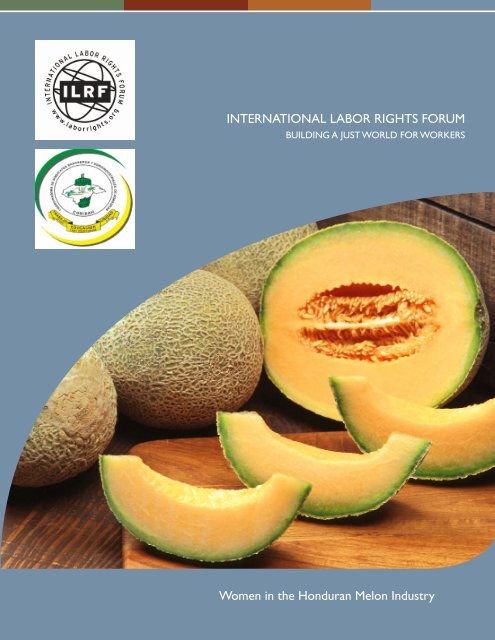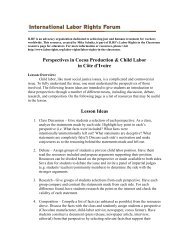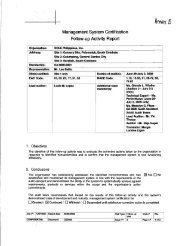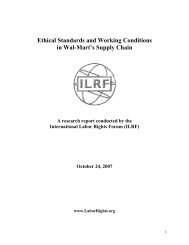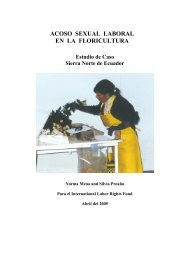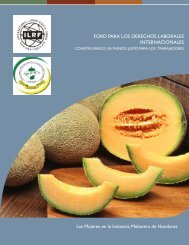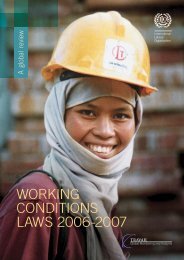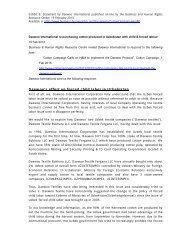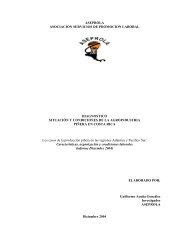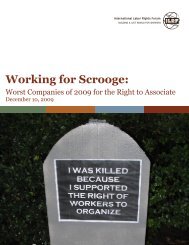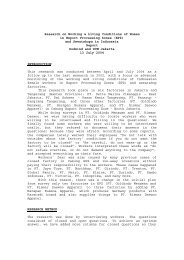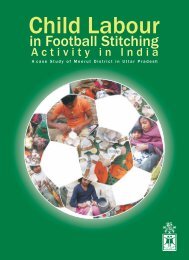Women in the Honduran Melon Industry - International Labor Rights ...
Women in the Honduran Melon Industry - International Labor Rights ...
Women in the Honduran Melon Industry - International Labor Rights ...
Create successful ePaper yourself
Turn your PDF publications into a flip-book with our unique Google optimized e-Paper software.
INTERNATIONAL LABOR RIGHTS FORUMBUILDING A JUST WORLD FOR WORKERS<strong>Women</strong> <strong>in</strong> <strong>the</strong> <strong>Honduran</strong> <strong>Melon</strong> <strong>Industry</strong>
ILRF would like to acknowledge <strong>the</strong> generous support of <strong>the</strong> Berger-Marks Foundation for <strong>the</strong> research and production of this report.<strong>International</strong> <strong>Labor</strong> <strong>Rights</strong> Forum1634 I St NW, Suite 1001Wash<strong>in</strong>gton, DC 20006Tel: (202) 347-4100Fax: (202) 347-4885laborrights@ilrf.orgwww.laborrights.org© 2012 by <strong>the</strong> <strong>International</strong> <strong>Labor</strong> <strong>Rights</strong> Forumand COSIBAHResearch and writ<strong>in</strong>g: COSIBAHWriter: Vail MillerSpanish translators: Hanna Claeson, Yudany LopezEditor: Liana FoxvogDesigner: Chelsie BiluckCoord<strong>in</strong>adora S<strong>in</strong>dicatos Bananeros yAgro<strong>in</strong>dustrias de Honduras (COSIBAH)Colonia Sitraterco100 Metros al N.O. del Parque CentralApdo. Postal 4128La Lima, Cortés, Honduras. C.A.Telefax: (504) 668-1736cosibah@colsibah.orgwww.cosibah.orgINTERNATIONAL LABOR RIGHTS FORUMWOMEN IN THE HONDURAN MELON INDUSTRY2
TABLE OF CONTENTSExecutive Summary........................................................................................ 2Introduction .................................................................................................... 4Work<strong>in</strong>g Conditions ......................................................................................6Conclusions and Recomendations .............................................................12Appendix A ......................................................................................................16INTERNATIONAL LABOR RIGHTS FORUMWOMEN IN THE HONDURAN MELON INDUSTRY1
EXECUTIVE SUMMARYRecent reforms to <strong>the</strong> melon <strong>in</strong>dustry have createdhigher product quality standards, but have failed toimprove labor standards. Workers <strong>in</strong> <strong>the</strong> melon <strong>in</strong>dustryrema<strong>in</strong> subjected to precarious employment, unsafework<strong>in</strong>g conditions and wages that are both illegally andunethically low.The situation is especially pronounced for <strong>the</strong> 25,000melon workers <strong>in</strong> sou<strong>the</strong>rn Honduras. In an attemptto rema<strong>in</strong> profitable amidst grow<strong>in</strong>g competition fromMexican producers, <strong>Honduran</strong> companies have lookedto cut production costs. All too often, however, <strong>the</strong>secost cutt<strong>in</strong>g strategies come at <strong>the</strong> expense of <strong>the</strong>irworkers. For <strong>the</strong> thousands of predom<strong>in</strong>antly female,poor, uneducated melon workers this means twelve tofourteen hour work days, seven days a week; salariesbelow m<strong>in</strong>imum wage with no overtime pay; exposure todangerous chemicals and <strong>in</strong>humane work<strong>in</strong>g conditions;and no access to social security.This report presents key f<strong>in</strong>d<strong>in</strong>gs of COSIBAH’s(Coord<strong>in</strong>adora de S<strong>in</strong>dicatos Bananeros yAgro<strong>in</strong>dustriales de Honduras) research <strong>in</strong>to <strong>the</strong>work<strong>in</strong>g conditions of female melon workers <strong>in</strong> sou<strong>the</strong>rnHonduras. This report also serves as a call to action,suggest<strong>in</strong>g ways <strong>in</strong> which workers’ rights to fair wagesand decent work<strong>in</strong>g conditions may be brought to <strong>the</strong>fore of melon companies’ corporate strategy, governmentprerogative, and consumer consciousness.WagesCOSIBAH discovered that over 85% of female melonworkers receive less than <strong>the</strong> m<strong>in</strong>imum wage. Inaddition, 69% of <strong>the</strong>se women work overtime hours forwhich nearly half of <strong>the</strong>m are not paid, and <strong>the</strong> majoritywork Sundays and holidays without pay. The <strong>Honduran</strong>m<strong>in</strong>imum wage for farmworkers is 112.33 lempiras(US$5.90) per day; however, <strong>the</strong> majority of melonworkers scrape by on well below a dollar a day perperson for <strong>the</strong> average family of six.Temporary Employment<strong>Melon</strong> farm<strong>in</strong>g is seasonal work, and almost all labor ishired on contracts of six months or less. Despite <strong>the</strong>brevity of <strong>the</strong> contract, most women return to work on<strong>the</strong> same plantation year after year. In keep<strong>in</strong>g contractsshort-term, employers are able to ma<strong>in</strong>ta<strong>in</strong> <strong>the</strong> upperhand on workers, with <strong>the</strong> threat of not renew<strong>in</strong>gemployment <strong>the</strong> next season. Temporary contractsalso make it difficult for melon workers to organizeand collectively claim <strong>the</strong>ir rights. <strong>Melon</strong> workersthus become more vulnerable to hazardous work<strong>in</strong>gconditions and sub-m<strong>in</strong>imum wages.Work<strong>in</strong>g ConditionsDays are long for melon workers: most report work<strong>in</strong>gtwelve to fourteen hour days and just over half receivea break for lunch. Only 30% of workers <strong>in</strong>terviewedare provided with potable water, restroom facilities, orcafeterias. Most of <strong>the</strong> workers are employed <strong>in</strong> <strong>the</strong>cutt<strong>in</strong>g of melons from <strong>the</strong> v<strong>in</strong>e, but despite frequentexposure to strong chemical fertilizers and <strong>in</strong>secticides,scarcely half of <strong>the</strong>m receive protective equipment orappropriate safety tra<strong>in</strong><strong>in</strong>g. As a result, many workerssuffer from work-related illnesses and <strong>in</strong>juries.Social Security<strong>Melon</strong> companies are required to pay <strong>in</strong>to Social Securityand guarantee that <strong>the</strong>ir employees have access to itsbenefits. Currently, melon companies are disregard<strong>in</strong>gthis law and <strong>the</strong>ir workers are suffer<strong>in</strong>g <strong>the</strong> consequences.Without social security benefits, women are forced to use<strong>the</strong> company’s medical facilities, lead<strong>in</strong>g to illegal layoffswithout compensation for pregnancy or work-related<strong>in</strong>jury.A Call to ActionThis report calls on melon companies to reform <strong>the</strong>irpractices to align with national law and <strong>in</strong>ternationallabor standards. Companies’ desires to reduce costsshould not take precedence over <strong>the</strong>ir obligation toprovide a safe and fair work<strong>in</strong>g environment. The<strong>Honduran</strong> government should not bow to <strong>the</strong> economicstrength of powerful agricultural companies. Instead,monitor<strong>in</strong>g commissions should identify abuses and hold<strong>the</strong> responsible companies accountable. Committeesand organizations that fight for workers’ rights must beprotected so that <strong>the</strong>y can freely promote labor andhuman rights.INTERNATIONAL LABOR RIGHTS FORUMWOMEN IN THE HONDURAN MELON INDUSTRY2
EXECUTIVE SUMMARYThe <strong>in</strong>ternational community successfully achieved <strong>the</strong>implementation and monitor<strong>in</strong>g of consumer healthstandards <strong>in</strong> <strong>the</strong> melon <strong>in</strong>dustry. The same preoccupationfor consumers’ safety should extend to <strong>the</strong> health, safetyand well-be<strong>in</strong>g of <strong>the</strong> <strong>in</strong>dividuals whose hard work br<strong>in</strong>gsmelons to our homes.COSIBAH, A <strong>Labor</strong> <strong>Rights</strong> WatchdogCoord<strong>in</strong>at<strong>in</strong>g Body of Banana and Agro<strong>in</strong>dustrial Workers’ Unions(COSIBAH), was founded <strong>in</strong> 1994 and has documented work<strong>in</strong>gconditions and educated farmworkers <strong>in</strong> sou<strong>the</strong>rn Hondurass<strong>in</strong>ce 2007. Their team of researchers designed and carried outa comprehensive worker survey <strong>in</strong> Choluteca. They <strong>in</strong>dividuallysurveyed 310 female melon workers and conducted fifteenseparate meet<strong>in</strong>gs with community leaders and focus groups. The<strong>International</strong> <strong>Labor</strong> <strong>Rights</strong> Forum <strong>the</strong>n worked with COSIBAH towrite and publish this report.INTERNATIONAL LABOR RIGHTS FORUMWOMEN IN THE HONDURAN MELON INDUSTRY3
INTRODUCTIONIn 2011, <strong>the</strong> melon <strong>in</strong>dustry captivated national and<strong>in</strong>ternational audiences with one of <strong>the</strong> worst foodborneillness outbreaks <strong>in</strong> recent decades. The listeriavirus claimed <strong>the</strong> lives of 25 people, hospitalized 123nationwide and led to <strong>the</strong> recall of some 300,000 casesof fruit. Even though <strong>the</strong> virus was l<strong>in</strong>ked to U.S.-growncantaloupes, both foreign and domestic melon companiessoon came under <strong>in</strong>tense public pressure to implementhigher standards <strong>in</strong> plant<strong>in</strong>g, harvest<strong>in</strong>g and production toprotect consumers – without address<strong>in</strong>g <strong>the</strong> health andsafety of <strong>the</strong> workers who grow and harvest <strong>the</strong> melons.<strong>Melon</strong>s are <strong>the</strong> United States’ second-largest import fruitfrom Honduras, after bananas. Although <strong>the</strong> United Statesproduces several thousand tons of melons for domesticconsumption and export each year, <strong>the</strong> nation is still a netimporter of honeydew, cantaloupe, cucumber, watermelonand several related melon species. Honduras is <strong>the</strong> fourthlargest exporter of melons to <strong>the</strong> U.S., provid<strong>in</strong>g 14% ofU.S. melon imports. <strong>Melon</strong>s are Honduras’ fourth-largestagricultural export, an important source of <strong>in</strong>comefor <strong>the</strong> country. These melons are grown <strong>in</strong> sou<strong>the</strong>rnHonduras, <strong>in</strong> <strong>the</strong> region of Choluteca.<strong>Melon</strong>s and Choluteca<strong>Melon</strong> cultivation was <strong>in</strong>troduced to Honduras bylarge corporations <strong>in</strong> <strong>the</strong> 1980s. The production rapidlyexpanded to an estimated 1000 small producers. Overtime some farms consolidated and o<strong>the</strong>rs left <strong>the</strong> marketdue to price and market restrictions, leav<strong>in</strong>g about 150farms, which sell <strong>the</strong>ir melons to four large companies-- Montelibano, Hondex, Suragro, and Agrogolfo -- forexport. These four companies determ<strong>in</strong>e <strong>the</strong> <strong>in</strong>dustrystandard for production quality and labor regulation. And,to a large extent, <strong>the</strong>y determ<strong>in</strong>e <strong>the</strong> standard of liv<strong>in</strong>g forCholuteca laborers.“We went <strong>in</strong>to this <strong>in</strong>vestigation more-or-less know<strong>in</strong>gthat <strong>the</strong> work<strong>in</strong>g conditions would be very bad, but wenever anticipated be<strong>in</strong>g confronted by such misery and<strong>in</strong>justice.”~COSIBAHAlthough melon sales total upwards of $55 millionannually, Choluteca is one of Honduras’ mostimpoverished regions. Choluteca’s economy is basedalmost exclusively on <strong>the</strong> foreign export of melons,mango, rice, cotton, sugar, bananas and shrimp. Theseasonal crops demand a temporary ‘unskilled’ laborforce that is contracted for <strong>the</strong> labor-<strong>in</strong>tensive plant<strong>in</strong>gand harvest<strong>in</strong>g months. As a result, job placementis competitive and most people f<strong>in</strong>d work for only afew months at a time. Choluteca suffers from a 44%unemployment rate and even higher under-employmentrate.“Dur<strong>in</strong>g melon season, women work as temporarylaborers. The rest of <strong>the</strong> year, <strong>the</strong>y are street vendors,cloth<strong>in</strong>g washers and domestic servants – where <strong>the</strong>y arealso exploited.”~COSIBAH<strong>Melon</strong> workers are hit hard dur<strong>in</strong>g <strong>the</strong> lean monthsbetween <strong>the</strong> plant<strong>in</strong>g and harvest<strong>in</strong>g seasons when workdries up. Their families scrape by on whatever meagersav<strong>in</strong>gs <strong>the</strong>y were able to hold onto dur<strong>in</strong>g <strong>the</strong> melonsseason. The estimated cost of liv<strong>in</strong>g for a family of six<strong>in</strong> this region is 6,198 lempiras, or about $325 a month.The average family, however, is only able to earn abouta third of that. For that reason, 60% of <strong>the</strong> populationsay that <strong>the</strong>ir entire paycheck goes towards putt<strong>in</strong>gfood on <strong>the</strong> table, with not enough rema<strong>in</strong><strong>in</strong>g for healthcare, education, cloth<strong>in</strong>g, and sanitary supplies. Powerfulowners hold almost all of <strong>the</strong> region’s land, leav<strong>in</strong>gord<strong>in</strong>ary people without <strong>the</strong> ability to establish farms,orchards, or gardens as an additional source of food. Asa result, malnutrition affects one <strong>in</strong> three people <strong>in</strong>Choluteca.INTERNATIONAL LABOR RIGHTS FORUMWOMEN IN THE HONDURAN MELON INDUSTRY4
INTRODUCTIONON GETTING BY:Families that struggle to make it through <strong>the</strong> leanmonths employ various strategies to cover <strong>the</strong>irbasic necessities, <strong>in</strong>clud<strong>in</strong>g:• eat<strong>in</strong>g cheaper, less-preferred food,• decreas<strong>in</strong>g meal size,• cutt<strong>in</strong>g meals,• tak<strong>in</strong>g out loans,• be<strong>in</strong>g paid <strong>in</strong> food,• sell<strong>in</strong>g domestic animals,• prioritiz<strong>in</strong>g children’s food <strong>in</strong>take over parents,• eat<strong>in</strong>g next year’s seed reserves,• migrat<strong>in</strong>g <strong>in</strong> search of work,• hav<strong>in</strong>g more family members work, and• sell<strong>in</strong>g off <strong>the</strong>ir possessions.“Many workers sadly told us that <strong>the</strong>y no longer own <strong>the</strong>land that <strong>the</strong>y used to use to cultivate corn, beans andyucca… They now have to rent that land.”~COSIBAHWorkers and Workers <strong>Rights</strong>The poverty of Cholutecan workers’ liv<strong>in</strong>g conditionsis <strong>the</strong> result of melon companies’ failure to typically payeven <strong>the</strong> legal m<strong>in</strong>imum wage. <strong>Honduran</strong> law sets clearlabor standards for agriculture; however, <strong>the</strong> economicpower wielded by melon companies <strong>in</strong> practice exempts<strong>the</strong>m from <strong>the</strong> consequences of noncompliance.<strong>Honduran</strong> <strong>Labor</strong> Law stipulates that farmworkers cannotbe required to work more than twelve hours a day and<strong>the</strong>y must be provided breaks total<strong>in</strong>g one and a halfhours. In addition, <strong>Honduran</strong> labor law is explicit as to<strong>the</strong> m<strong>in</strong>imum wage and benefits that are to be <strong>in</strong>cluded<strong>in</strong> any labor agreement, <strong>the</strong> violation of which places <strong>the</strong>employer at fault and subject to f<strong>in</strong>es. Unfortunately,<strong>the</strong>se regulations frequently go unenforced. The majormelon companies have such a significant role <strong>in</strong> <strong>the</strong>regional and national economy that often <strong>the</strong>ir laborpractices go unmonitored and <strong>the</strong>ir wrongs unpunished.“The labor situation <strong>in</strong> this region has always beenprecarious because <strong>the</strong> State does not seem tounderstand its role as defender of human and laborrights… <strong>Melon</strong> companies act with impunity like feudallords whose <strong>in</strong>terests cannot be meddled with.”~COSIBAHWorkers at Suragro have <strong>in</strong>dicated that although <strong>the</strong>Secretary of <strong>Labor</strong> has <strong>in</strong>spected <strong>the</strong> company andidentified violations of labor and m<strong>in</strong>imum wage laws,Suragro would ra<strong>the</strong>r pay f<strong>in</strong>es than reform <strong>the</strong>iremployment practices. Suragro is not alone: all <strong>the</strong> majormelon companies know<strong>in</strong>gly and will<strong>in</strong>gly subject workersto illegal and debilitat<strong>in</strong>g work<strong>in</strong>g conditions. These samecompanies operate with relative impunity. They facelittle or no repercussion from government authoritiesand <strong>the</strong>y have effectively stifled union organiz<strong>in</strong>g. Amidstthis anti-worker and anti-union climate, <strong>the</strong>re is onlyone workers’ union comprised of 65 membersrepresent<strong>in</strong>g <strong>the</strong> plight of Choluteca’s more than50,000 poor and exploited farmworkers.“<strong>Melon</strong> companies are not <strong>in</strong>terested <strong>in</strong> <strong>the</strong> healthof <strong>the</strong>ir workers; <strong>the</strong>y are only <strong>in</strong>terested <strong>in</strong> what <strong>the</strong>yproduce.”~COSIBAHGiven <strong>the</strong> <strong>in</strong>different actions of <strong>the</strong> <strong>Honduran</strong>government, <strong>the</strong> lack of union organization, and <strong>the</strong>limited public knowledge of <strong>the</strong> issue, much more needsto be done to correct <strong>the</strong> grave labor violations of<strong>Honduran</strong> melon companies.INTERNATIONAL LABOR RIGHTS FORUMWOMEN IN THE HONDURAN MELON INDUSTRY5
WORKING CONDITIONSEmployment and Hir<strong>in</strong>gThe exploitation of melon workers beg<strong>in</strong>s with <strong>the</strong> hir<strong>in</strong>gand contract<strong>in</strong>g process. Workers are hired on shorttermcontracts, with <strong>the</strong> terms of employment oftennot adequately disclosed, mak<strong>in</strong>g it difficult or nearlyimpossible for workers to denounce violations of <strong>the</strong>irrights.Of <strong>the</strong> 25,000 melon workers <strong>in</strong> Choluteca, 98% areemployed on temporary contracts. Accord<strong>in</strong>g toworkers, <strong>the</strong>se contracts are valid for a maximum ofsix months. Contracts are often entered <strong>in</strong>to verbally,leav<strong>in</strong>g no formal documentation of <strong>the</strong> labor agreement.This violation of <strong>Honduran</strong> law means that workers are<strong>in</strong> a vulnerable position with m<strong>in</strong>imal possibility of legalrecourse for abuses committed by <strong>the</strong>ir employers.Precarious Work<strong>Labor</strong> rights protections are underm<strong>in</strong>edworldwide as permanent, regular jobs arereplaced by contract labor and temporary,unstable work – a pattern and practice known as“precarious work.” These workers are subject tounstable employment, low wages and dangerouswork<strong>in</strong>g conditions. They rarely receive socialbenefits and are often denied <strong>the</strong> right to jo<strong>in</strong>a union. Even when <strong>the</strong>y have <strong>the</strong> legal right tounionize, workers are afraid to organize if <strong>the</strong>y areeasily replaceable.Although many melon workers have been with <strong>the</strong> samecompany for three years or more – some even upwardsof 30 years – <strong>the</strong>y are denied job security. They do notsign long-term contracts but <strong>in</strong>stead are hired for only ayear at a time. Most melon workers are young mo<strong>the</strong>rs– nearly a third are s<strong>in</strong>gle mo<strong>the</strong>rs rais<strong>in</strong>g two or morechildren. Their <strong>in</strong>ability to depend on a stable, cont<strong>in</strong>uous<strong>in</strong>come leaves <strong>the</strong>ir families <strong>in</strong> a constant precarious state.<strong>Honduran</strong> law requires justification for fir<strong>in</strong>g an employee,establishes severance pay, and creates social securitybenefits for employees. But by keep<strong>in</strong>g contractsshort-term, companies can get around many of <strong>the</strong>serequirements by not re-hir<strong>in</strong>g workers or threaten<strong>in</strong>g notto contract with <strong>the</strong>m aga<strong>in</strong>. Any woman brave enoughto speak up could f<strong>in</strong>d herself without a job <strong>the</strong> follow<strong>in</strong>gseason. Pregnant women are particularly vulnerable. Itis aga<strong>in</strong>st <strong>Honduran</strong> law to test for pregnancy as part of<strong>the</strong> hir<strong>in</strong>g process or to fire an employee for becom<strong>in</strong>gpregnant. Despite this law, one fifth of <strong>the</strong> womensurveyed were forced to take a pregnancy testbefore be<strong>in</strong>g hired. 17% reported hav<strong>in</strong>g been fired forbecom<strong>in</strong>g pregnant and 37% knew a coworker who hadbeen fired for pregnancy.“When we are pregnant, <strong>the</strong>y fire us. For that reason,women don’t look for work when <strong>the</strong>y are pregnantand if <strong>the</strong>y become pregnant, <strong>the</strong>y don’t say anyth<strong>in</strong>g toanyone because <strong>the</strong>y know that <strong>the</strong>y will surely be fired.”~COSIBAH AGender discrim<strong>in</strong>ation does not end <strong>the</strong>re. 12% of<strong>the</strong> women <strong>in</strong>terviewed disclose that <strong>the</strong>y have beendiscrim<strong>in</strong>ated aga<strong>in</strong>st on <strong>the</strong> basis of <strong>the</strong>ir gender, mostcommonly through verbal abuse. 6% report be<strong>in</strong>gsubjected to sexual harassment at work by a boss orco-worker. The few women brave enough to reportthis harassment to management saw no result. Thefear of be<strong>in</strong>g fired or not re-hired deters many womenfrom denounc<strong>in</strong>g workplace discrim<strong>in</strong>ation. O<strong>the</strong>rsare unaware of <strong>the</strong>ir labor rights and of what behavioris legally permissible <strong>in</strong> <strong>the</strong> workplace, and do not filecompla<strong>in</strong>ts of harassment for this reason.“Thank goodness that you are <strong>in</strong>terested <strong>in</strong> do<strong>in</strong>gsometh<strong>in</strong>g for us. You will see how poorly <strong>the</strong>y treat us…<strong>the</strong>y are shameless.”~COSIBAH<strong>Melon</strong> companies capitalize on employees’ lack ofknowledge of <strong>the</strong>ir rights. The worker <strong>in</strong>terviews showedthat only limited <strong>in</strong>formation is disclosed to workers <strong>in</strong><strong>the</strong> hir<strong>in</strong>g process. 16% of workers were unable to name<strong>the</strong> company that <strong>the</strong>y work for and 39% did not know<strong>the</strong> exact length of <strong>the</strong>ir contract. Most women werehired with just a photocopy of <strong>the</strong>ir ID card and did notreceive a copy of <strong>the</strong>ir contract. Just over half of <strong>the</strong>workers could name Sol and Mike’s <strong>Melon</strong>s as <strong>the</strong> brandnames of <strong>the</strong>ir melons. This lack of knowledge suggestsa deliberate attempt by <strong>the</strong> melon companies to keepworkers <strong>in</strong> <strong>the</strong> dark.INTERNATIONAL LABOR RIGHTS FORUMWOMEN IN THE HONDURAN MELON INDUSTRY6
WORKING CONDITIONSNot only are melon workers uncerta<strong>in</strong> of <strong>the</strong> termsof <strong>the</strong>ir employment, <strong>the</strong>y are unaware of <strong>the</strong>ir rightsas workers and as people. Only 18% of <strong>the</strong> surveyedwomen were able to identify a s<strong>in</strong>gle labor right. Theywere equally hard pressed to identify <strong>the</strong>ir human rights:18% could name one or two human rights; 82% providedno answer. Without knowledge of <strong>the</strong> rights to which <strong>the</strong>yare entitled, workers will cont<strong>in</strong>ue to be exploited.Work<strong>in</strong>g Conditions Illegal, Unethical,InhumaneEach day, melon workers <strong>in</strong> sou<strong>the</strong>rn Honduras toilfor up to 14 hours, often <strong>in</strong> dangerous, unsanitary andillegal conditions. They face long hours, exposure totoxic chemicals, and an <strong>in</strong>hospitable work environment.Unable to unionize and without knowledge of appropriatelegal recourse, <strong>the</strong>y cont<strong>in</strong>ue to work <strong>in</strong> spite of <strong>the</strong>sedeplorable conditions. As a result, on-site <strong>in</strong>juries, jobrelatedhealth problems and worker exploitation occuron a regular basis.Days are long on <strong>the</strong> melon plantation. Most workersget up at 4 a.m. to beg<strong>in</strong> <strong>the</strong> trek to <strong>the</strong> bus stop ormeet<strong>in</strong>g po<strong>in</strong>t where <strong>the</strong>y will catch a bus or jump <strong>in</strong> <strong>the</strong>back of <strong>the</strong> company pick-up truck to be driven up to 75kilometers to work. The workday starts around 6 a.m.and can range from 8 to 14 hours. Only 37% of workersreport leav<strong>in</strong>g at <strong>the</strong> end of an 8-hour day. Most f<strong>in</strong>ish<strong>the</strong>ir work day around 4 or 5 p.m. and arrive home as lateas 8 or 9 p.m.“When I leave before dawn, my children are sleep<strong>in</strong>g andwhen I return home, <strong>the</strong>y are sleep<strong>in</strong>g. I don’t know if<strong>the</strong>y ate, if someth<strong>in</strong>g important happened <strong>in</strong> <strong>the</strong>ir day…I feel totally disconnected from my family.”~Anonymous WorkerMost melon workers spend <strong>the</strong> entire day out <strong>in</strong> <strong>the</strong>fields under <strong>the</strong> hot sun, cutt<strong>in</strong>g fruit. Despite <strong>the</strong>physically demand<strong>in</strong>g and exhaustive nature of <strong>the</strong>ir work,half of all workers say that <strong>the</strong>y do not receive a break,even for lunch. Less than one <strong>in</strong> five workers receive anadditional rest break <strong>in</strong> addition to lunch. Those womenwho are permitted a break of any sort are generally notprovided with adequate rest facilities. Two thirds of<strong>the</strong> workers report not hav<strong>in</strong>g access to runn<strong>in</strong>gor potable water, a cafeteria or designated eat<strong>in</strong>garea or restroom facilities. They are forced to br<strong>in</strong>gwith <strong>the</strong>m enough water to support eight or more hoursof <strong>in</strong>tense work <strong>in</strong> direct sunlight. They are humiliatedby hav<strong>in</strong>g to relieve <strong>the</strong>mselves <strong>in</strong> <strong>the</strong> fields without<strong>the</strong> privacy of a restroom or outhouse. They are notprovided any place to r<strong>in</strong>se off or clean up.“There is no shade, even dur<strong>in</strong>g our lunch break. Thereare no restrooms, nor water to dr<strong>in</strong>k or wash our hands.We must relieve ourselves out <strong>in</strong> <strong>the</strong> open.”~Anonymous Worker<strong>Women</strong> generally work as fruit planters, cutters, planters,cleaners or <strong>in</strong> o<strong>the</strong>r related capacities. The work ismonotonous, strenuous and without <strong>the</strong> propertra<strong>in</strong><strong>in</strong>g, dangerous. Fruit cutters work with sharptools that require proper tra<strong>in</strong><strong>in</strong>g and protective gear.The benefit of proper tra<strong>in</strong><strong>in</strong>g <strong>in</strong> safe cutt<strong>in</strong>g practiceshardly needs be underscored. The work of planters andcleaners typically <strong>in</strong>volves <strong>the</strong> use of powerful noxiouschemical fertilizers, pesticides and cleaners. <strong>Honduran</strong>law requires companies to establish occupational hygieneand safety committees to tra<strong>in</strong> and supervise employees<strong>in</strong> <strong>the</strong> proper use of potentially dangerous equipment andactivities. While most workers report that <strong>the</strong>re is sucha committee at <strong>the</strong>ir workplace, <strong>the</strong>y express concernsabout <strong>the</strong>m, say<strong>in</strong>g: “They do noth<strong>in</strong>g but chat withcompany officials.” Workers generally know very littleof <strong>the</strong>ir labor rights <strong>in</strong> <strong>the</strong> areas of occupational healthand have limited understand<strong>in</strong>g of safety and hygieneregulations.When hygiene and safety committees fail, workers suffer.Few are properly tra<strong>in</strong>ed to handle <strong>the</strong> mach<strong>in</strong>eryor tools that <strong>the</strong>y operate, and just over half of allworkers receive any sort of protective equipmentfor <strong>the</strong>ir work. This means that many women spend allday cutt<strong>in</strong>g fruit from <strong>the</strong> v<strong>in</strong>e without so much as gloves,masks, goggles or sun-protective cloth<strong>in</strong>g. The statisticsare tell<strong>in</strong>g: 40% of workers have been <strong>in</strong> an accidentcaused by damaged tools or faulty mach<strong>in</strong>es; 16% haveINTERNATIONAL LABOR RIGHTS FORUMWOMEN IN THE HONDURAN MELON INDUSTRY7
WORKING CONDITIONSWORKER TESTIMONY: AGUSTINA ALVAREZ MARTINEZ“I lost a f<strong>in</strong>ger due to <strong>the</strong> irresponsibility of <strong>the</strong> Suragro-Fyffes <strong>Melon</strong> Company.I have worked with <strong>the</strong> company for 15 years and <strong>in</strong> all that time, <strong>the</strong> companyhas never paid us <strong>the</strong> m<strong>in</strong>imum wage nor afforded us <strong>the</strong> rights established by<strong>the</strong> labor code.I suffered an accident at work on April 15, 2010. As I arrived at my place ofwork and went to get off of <strong>the</strong> truck, my hand became trapped <strong>in</strong> <strong>the</strong> bars of<strong>the</strong> truck bed and my right-hand middle f<strong>in</strong>ger was dragged away with<strong>the</strong> truck until it broke off. At this time, we could not f<strong>in</strong>d an immediatesupervisor and some of my colleagues told <strong>the</strong> driver to take me to <strong>the</strong>Fergusson Cl<strong>in</strong>ic because <strong>the</strong>y give medical attention to some of <strong>the</strong> Suragroworkers.They took me to this cl<strong>in</strong>ic, s<strong>in</strong>ce none of <strong>the</strong> thousands of Suragro-Fyffesworkers <strong>in</strong>clud<strong>in</strong>g myself, have a right to medical care <strong>in</strong> <strong>the</strong> <strong>Honduran</strong> Instituteof Social Security (IHSS). Once <strong>the</strong>y had treated me, <strong>the</strong> head of HumanResources, Juan Carlos Rosales, told me that <strong>the</strong> obligation of <strong>the</strong> companyended here and that I should go home and once I had recuperated, Icould return to <strong>the</strong> company to see if <strong>the</strong>y could give me work aga<strong>in</strong>.[Soon after] a friend from work directed me to <strong>the</strong> offices of COSIBAH whichshe heard about on <strong>the</strong> Radio Paz “Union Torch” radio program that speaks to<strong>the</strong> rights of workers. She told me that <strong>the</strong>y give free advice to workers and notto seek out a lawyer because <strong>the</strong>y charge an arm and a leg.The follow<strong>in</strong>g day, Rosa Estrada (of COSIBAH) accompanied me to <strong>the</strong> officesdo <strong>the</strong> M<strong>in</strong>istry of <strong>Labor</strong>. Rosa <strong>in</strong>formed me that she would put my case on <strong>the</strong>COSIBAH web page because <strong>the</strong>y already had a campaign to pressure Suragro-Fyffes to provide us workers with our rights. A few days later, Rosa broughtme to an <strong>in</strong>ternet café and showed me a photo of my hand and read me <strong>the</strong>accompany<strong>in</strong>g announcement.To my surprise, a few days later Juan Carlos Rosales called me to <strong>in</strong>form methat <strong>the</strong> company was go<strong>in</strong>g to pay for my medical assistance and recuperationtime and hire me back once I had healed- but that I had to stop work<strong>in</strong>g withCOSIBAH because <strong>the</strong>y were out to harm <strong>the</strong> company. But I did not listento Mr. Rosales because were it not for COSIBAH, he would not haveoffered me any assistance nor would he have paid for my <strong>in</strong>jury leave.I am be<strong>in</strong>g treated at <strong>the</strong> TELETON and I am await<strong>in</strong>g a medical op<strong>in</strong>ion thatestablishes my degree of disability so that <strong>the</strong> company will compensate me for<strong>the</strong> <strong>in</strong>jury that I suffered.”INTERNATIONAL LABOR RIGHTS FORUMWOMEN IN THE HONDURAN MELON INDUSTRY8
WORKING CONDITIONSNearly 70% of <strong>the</strong> women regularly work longer thaneight hours a day, 41% of <strong>the</strong>m without overtimecompensation.Overtime work, both <strong>in</strong> <strong>the</strong> form of n<strong>in</strong>eplushour workdays and six- or seven-day workweeks, isnot optional but expected. <strong>Melon</strong> companies capitalizeon <strong>the</strong> shortage of work and desperate condition of<strong>the</strong> Choluteca population to drive salaries down andwork hours up. A majority of <strong>the</strong> women surveyed donot receive compensation for work<strong>in</strong>g Sundays (<strong>the</strong>irsupposed day of rest) or for work<strong>in</strong>g holidays. Oneworker said, “They are shameless. Sometimes <strong>the</strong>y don’tpay us <strong>in</strong> full, tell<strong>in</strong>g us that <strong>the</strong> computer messed up, thatit’s not <strong>the</strong>ir fault and that if we try to compla<strong>in</strong>, <strong>the</strong>y’llfire us and will not hire us aga<strong>in</strong>.”<strong>Melon</strong> companies have such a great <strong>in</strong>fluence over<strong>the</strong> local government and economy that <strong>the</strong>y do noteven attempt to hide <strong>the</strong>ir corrupt wage and overtimepractices. Between 2009 and 2011, <strong>the</strong> CholutecaM<strong>in</strong>istry of <strong>Labor</strong> <strong>in</strong>spected affiliates or branches ofall four of <strong>the</strong> major melon-export companies. Everys<strong>in</strong>gle company was cited for failure to producevalid worker contracts and/or failure to paym<strong>in</strong>imum wage and overtime hours. <strong>Industry</strong> leaderOKRA SUR was visited twice dur<strong>in</strong>g this period and wascited both times for failure to reform wage violations.Suragroh, owned by transnational fruit company Fyffes,has paid a 90,000 lempiras ($4700) f<strong>in</strong>e several times,but workers report that it prefers to pay <strong>the</strong>se smallsums ra<strong>the</strong>r than reform its policies to comply with <strong>the</strong>m<strong>in</strong>imum wage and o<strong>the</strong>r labor laws.“Representatives of <strong>the</strong> M<strong>in</strong>istry of <strong>Labor</strong> are <strong>the</strong>melon companies’ unconditional lackeys because of <strong>the</strong>economic power of that <strong>the</strong>y possess. For that reason,<strong>the</strong>re is no respect for labor laws, no recognition of socialsecurity dues, no Sunday pay, no safety and sanitation,no written contracts, no <strong>in</strong>ternal supervision of work, noemployee registration -- <strong>in</strong> essence, noth<strong>in</strong>g.”~COSIBAH <strong>in</strong>vestigator German ZepedaThe dom<strong>in</strong>ant companies’ collective decision to ignorecitations and openly defy labor laws makes it nearlyimpossible for workers to demand fair wages. Without<strong>the</strong> support of <strong>the</strong> government and with no labor unionrepresentation, melon workers have little chance forrecourse. Workers cite cases <strong>in</strong> which employees werefired for attempt<strong>in</strong>g to obta<strong>in</strong> <strong>the</strong>ir owed wages withwork vouchers. O<strong>the</strong>rs note occasions of apparentblacklist<strong>in</strong>g, <strong>in</strong>cidents of outspoken workers not be<strong>in</strong>gable to f<strong>in</strong>d work <strong>the</strong> follow<strong>in</strong>g season – ei<strong>the</strong>r with <strong>the</strong>irformer employer, or with any o<strong>the</strong>r melon company.Unable to address <strong>the</strong>se problems with <strong>the</strong>ir employersand with no support from authorities, workers are left <strong>in</strong>a seem<strong>in</strong>gly hopeless situation.“I don’t th<strong>in</strong>k that this will ever change, because <strong>the</strong>owners of <strong>the</strong> plantations do whatever <strong>the</strong>y want with<strong>the</strong>ir workers, and <strong>the</strong> M<strong>in</strong>istry of <strong>Labor</strong> does noth<strong>in</strong>gwhen <strong>the</strong>y visit -- all <strong>the</strong>y do is tell us off, tell us that wemust be responsible workers.”~Anonymous WorkerChild <strong>Labor</strong>Although <strong>the</strong> <strong>in</strong>vestigation did not uncover significantcases of child labor, workers acknowledged that m<strong>in</strong>orsare seen on farms <strong>in</strong> <strong>the</strong> area, without <strong>the</strong> permissionof <strong>the</strong> M<strong>in</strong>istry of <strong>Labor</strong>. The long hours and overlystrenuous conditions that workers <strong>in</strong> <strong>the</strong> fields face areespecially hard on m<strong>in</strong>ors. The extreme poverty of <strong>the</strong>region makes it difficult for many of <strong>the</strong>se children to stay<strong>in</strong> school, and <strong>the</strong>y f<strong>in</strong>d <strong>the</strong>mselves forced to work tosupport <strong>the</strong>ir families.It is true that it is technically aga<strong>in</strong>st company policyto contract child labor. After <strong>the</strong> last harvest<strong>in</strong>g season,women were notified that <strong>the</strong>y would not be hired unless<strong>the</strong>y possessed identification <strong>in</strong>dicat<strong>in</strong>g <strong>the</strong>y are of age.However, one must question <strong>the</strong> s<strong>in</strong>cerity of this sort ofpolicy. COSIBAH notes that it is not uncommon for manyboys and girls to borrow documentation from adultsdur<strong>in</strong>g <strong>the</strong> hir<strong>in</strong>g process, a practice that <strong>the</strong> companyrecognizes but turn a bl<strong>in</strong>d eye to. Work<strong>in</strong>g contractsgiven to m<strong>in</strong>ors are usually subject to some k<strong>in</strong>d ofstipulation, for example hav<strong>in</strong>g built up friendship or trustwith supervisors. Reports published by <strong>the</strong> M<strong>in</strong>istry of<strong>Labor</strong> <strong>in</strong> <strong>the</strong> region confirm that melon companies arecont<strong>in</strong>u<strong>in</strong>g to hire children.INTERNATIONAL LABOR RIGHTS FORUMWOMEN IN THE HONDURAN MELON INDUSTRY10
CONCLUSIONS AND RECOMMENDATIONSIn <strong>in</strong>terviews with 310 <strong>Honduran</strong> female melon workers and fifteen separate group meet<strong>in</strong>gs, COSIBAH identified laborrights violations <strong>in</strong> <strong>the</strong> areas of temporary and precarious employment, wage violations, unsafe and <strong>in</strong>humane work<strong>in</strong>gconditions, and failure to provide social security benefits.COSIBAH attributes <strong>the</strong> deplorable work<strong>in</strong>g conditions suffered by <strong>the</strong> workers primarily to <strong>the</strong> <strong>in</strong>difference of meloncompanies. Without stronger recourse by <strong>the</strong> <strong>Honduran</strong> government and public pressure by <strong>the</strong> <strong>in</strong>ternational community,melon workers will not escape from <strong>the</strong>ir lives of exploitation and extreme poverty.The follow<strong>in</strong>g table outl<strong>in</strong>es some recommendations that COSIBAH and <strong>the</strong> ILRF believe are necessary to address <strong>the</strong>violations mentioned above.ADDRESS ACTORS ACTIONSTemporary, Precarious <strong>Labor</strong> <strong>Melon</strong> Companies • Adopt a hir<strong>in</strong>g scheme that offers long-term employmentto workers• Strictly enforce documentation requirements for jobapplicants and do not contract with children• Comply with all national standards for employment,<strong>in</strong>clud<strong>in</strong>g <strong>the</strong> prohibition of pregnancy test<strong>in</strong>g• Enter <strong>in</strong>to formal employment contracts with workersand ensure that all workers receive a formal appo<strong>in</strong>tmentletter sett<strong>in</strong>g out <strong>the</strong> terms of <strong>the</strong>ir contract• Fully disclose to employees all terms of work contractsand ensure that <strong>the</strong>y understand <strong>the</strong>m by review<strong>in</strong>gcontract terms verbally <strong>in</strong> consideration of illiterateemployees and publically post<strong>in</strong>g labor rights and applicableCode of Conduct <strong>in</strong>formationTemporary, Precarious <strong>Labor</strong> <strong>Honduran</strong> Government • Ensure that every worker is documented <strong>in</strong> formalwritten employment contracts and that all workers receivea copy of <strong>the</strong>ir contract• Perform regular monitor<strong>in</strong>g visits to plantations <strong>in</strong> orderto verify appropriate company documentation of employeesand <strong>in</strong>clude <strong>in</strong>dependent <strong>in</strong>terviews with workers <strong>in</strong>order to formulate an unbiased assessment of companycompliance with labor laws• Develop and implement tougher repercussions for laborviolations: <strong>in</strong>crementally <strong>in</strong>crease f<strong>in</strong>es for violations and<strong>in</strong>troduce serious non-monetary punishments for noncompliance,such as clos<strong>in</strong>g <strong>the</strong> plantationTemporary, Precarious <strong>Labor</strong> COSIBAH/Unions • Work with labor unions <strong>in</strong> o<strong>the</strong>r regional agriculturalsectors <strong>in</strong> order to demand that employers comply withlabor rightsINTERNATIONAL LABOR RIGHTS FORUMWOMEN IN THE HONDURAN MELON INDUSTRY12
CONCLUSIONS AND RECOMMENDATIONSADDRESS ACTORS ACTIONSTemporary, Precarious <strong>Labor</strong> Buyers • Adopt a Code of Conduct and <strong>in</strong>corporate a clauseprohibit<strong>in</strong>g <strong>the</strong> use of unfair labor throughout <strong>the</strong> entiresupply cha<strong>in</strong> and requir<strong>in</strong>g mandatory registration of allworkers for long-term contracts when possible• Report publicly on <strong>the</strong> company’s policies for supplier/vendor selection, management, and/or term<strong>in</strong>ation• Publicly release <strong>the</strong> list of melon plantations• Set up an <strong>in</strong>ternal monitor<strong>in</strong>g system and report publiclyon audit<strong>in</strong>g policies, mechanisms and results. The audit<strong>in</strong>gagenda shall <strong>in</strong>clude but not be limited to <strong>the</strong> follow<strong>in</strong>gtopics: precarious contract<strong>in</strong>g, wages, child labor, work<strong>in</strong>ghours, social security benefits, work<strong>in</strong>g environment andworkers’ right to organize and barga<strong>in</strong> collectively.Wage Violations <strong>Melon</strong> Companies • Incorporate a liv<strong>in</strong>g wage clause <strong>in</strong> <strong>the</strong> Code of Conduct• Ensure that <strong>the</strong> salary and benefits, which must be atleast equal to <strong>the</strong> legal m<strong>in</strong>imum wage, are clarified andguaranteed <strong>in</strong> <strong>the</strong> formal appo<strong>in</strong>tment letters• Work with unions and NGOs to conduct <strong>in</strong>ternalaudit<strong>in</strong>g and report publicly on <strong>the</strong> audit<strong>in</strong>g results. Theaudit<strong>in</strong>g agenda shall <strong>in</strong>clude but not be limited to <strong>the</strong>follow<strong>in</strong>g topics: precarious contract<strong>in</strong>g, wages, childlabor, work<strong>in</strong>g hours, social security benefits, work<strong>in</strong>genvironment and workers’ right to organize and barga<strong>in</strong>collectively.Wage Violations <strong>Honduran</strong> Government • Incorporate a liv<strong>in</strong>g wage clause <strong>in</strong>to regionaland national m<strong>in</strong>imum wage law and ensure that it is<strong>in</strong>corporated <strong>in</strong>to employee contracts• Strictly enforce all labor requirements, <strong>in</strong>clud<strong>in</strong>g eighthour workdays and 44 hour workweeks. Ensure thatworkers are not forced to work overtime, which o<strong>the</strong>rwiseis a violation of <strong>the</strong> exist<strong>in</strong>g forced labor prohibition.• Perform both disclosed and discrete audits to ensurethat payment schedules, <strong>in</strong>clud<strong>in</strong>g Sunday pay and bonusprograms, are set out <strong>in</strong> labor contracts and providedaccord<strong>in</strong>gly, and that payments are made on timeWage Violations COSIBAH/ Unions • Work with labor unions <strong>in</strong> o<strong>the</strong>r regional agriculturalsectors <strong>in</strong> order to demand that employers comply withlabor rightsINTERNATIONAL LABOR RIGHTS FORUMWOMEN IN THE HONDURAN MELON INDUSTRY13
CONCLUSIONS AND RECOMMENDATIONSADDRESS ACTORS ACTIONSWage Violations Buyers • Buyers• Incorporate a liv<strong>in</strong>g wage clause <strong>in</strong> <strong>the</strong> Code of Conduct• Ensure that payment schedules are set out <strong>in</strong> supplycontracts and that payments are made on time• Work with local NGOS to <strong>in</strong>itiate and sponsor researchon <strong>the</strong> current payment system to identify <strong>the</strong> impact of fairpay on <strong>the</strong> workers’ livelihoodsUnsafe and Inhumane WorkEnvironmentUnsafe and Inhumane WorkEnvironmentUnsafe and Inhumane WorkEnvironment<strong>Melon</strong> Companies<strong>Honduran</strong> GovernmentBuyers• Include regular surprise <strong>in</strong>ternal audits and reportpublicly on <strong>in</strong>ternal audit<strong>in</strong>g policies, mechanism and results• Unsafe and Inhumane Work Environment• <strong>Melon</strong> Companies• Incorporate a health and safety standard <strong>in</strong> <strong>the</strong> Code ofConduct and ensure that <strong>the</strong> standard meets national laborlaw requirements, <strong>in</strong>ternational labor standards, and meloncertification standards• Provide occupational and safety tra<strong>in</strong><strong>in</strong>g to all workersat <strong>the</strong> beg<strong>in</strong>n<strong>in</strong>g of <strong>the</strong>ir employment and ensure thatoccupational safety and hygiene committees actuallyfunction as <strong>in</strong>tended• Equip all employees with <strong>the</strong> necessary protectiveequipment and safety gear• Work with unions and NGOs to conduct <strong>in</strong>ternalaudit<strong>in</strong>g and report publicly on audit<strong>in</strong>g results• Ensure that all health and safety codes arecomprehensive and mandate that companies publicly postsafety requirements• Perform more thorough audit<strong>in</strong>g practices <strong>in</strong>clud<strong>in</strong>gsurprise or non-disclosed audits and ensure thatrepercussions for health and safety violations are sufficientlybold.• Protect NGOs and unions to ensure that <strong>the</strong>y caneffectively represent workers rights <strong>in</strong> regards to a safework<strong>in</strong>g environment• Incorporate a health and safety standard <strong>in</strong> <strong>the</strong> Code ofConduct and ensure such standard meet <strong>the</strong> requirementsas laid down <strong>in</strong> national labor laws, <strong>in</strong>ternational laborstandards, and melon certification standards.• Work with local NGOs to audit plantations and reportpublicly on audit<strong>in</strong>g policies and results.INTERNATIONAL LABOR RIGHTS FORUMWOMEN IN THE HONDURAN MELON INDUSTRY14
CONCLUSIONS AND RECOMMENDATIONSADDRESS ACTORS ACTIONSUnsafe and Inhumane WorkEnvironmentCOSIBAH/ Unions• Establish alliances with local NGOs to ensure crosssectorworker protectionSocial Security Benefits <strong>Melon</strong> Companies • Incorporate a social security standard <strong>in</strong>to <strong>the</strong> Codeof Conduct and ensure that employees are provided withaccess to heath, <strong>in</strong>jury, maternity leave and educationalbenefitsSocial Security Benefits <strong>Honduran</strong> Government • Ensure that companies comply with regional and nationalrequirements for <strong>the</strong> provision of social security• Perform more thorough audit<strong>in</strong>g practices <strong>in</strong>clud<strong>in</strong>gsurprise or non-disclosed audits and ensure thatrepercussions for social security provision violations aresufficiently boldSocial Security Benefits Buyers • Incorporate a health and safety standard <strong>in</strong> <strong>the</strong> Code ofConduct and ensure such standard meet <strong>the</strong> requirementsas laid down <strong>in</strong> national labor laws, <strong>in</strong>ternational laborstandards, and melon certification standards.• Work with local NGOs to audit plantations and reportpublicly on audit<strong>in</strong>g policies and results.Social Security Benefits COSIBAH/ Unions • Work with labor unions <strong>in</strong> o<strong>the</strong>r regional agriculturalsectors <strong>in</strong> order to demand that employers comply withlabors rightsIn summary, improv<strong>in</strong>g <strong>the</strong> conditions of female melon workers <strong>in</strong> sou<strong>the</strong>rn Honduras will require <strong>the</strong> conscious effort ofmelon buyers, Choluteca government officials, local workers’ unions and melon buyers. Exist<strong>in</strong>g laws and standards mustbe enforced and stronger audit<strong>in</strong>g and report<strong>in</strong>g mechanisms must be created <strong>in</strong> order to ensure that <strong>the</strong> women maylive healthy and dignified lives.INTERNATIONAL LABOR RIGHTS FORUMWOMEN IN THE HONDURAN MELON INDUSTRY15
APPENDIX ASurvey of <strong>Women</strong> <strong>Melon</strong> <strong>Industry</strong> Workers, Sou<strong>the</strong>rn RegionA. General Information1. First and last names of <strong>in</strong>terviewed worker:________________________________ ________________2. Age:A. ____ years of age9. List three rights that you have as a worker:A. ____________________________________________________________B. ____________________________________________________________C. ________________________________________________________________ Number of rights correctly listed.3. Marital Status:A. __ S<strong>in</strong>gleB. __ MarriedC. __ Common Law MarriageD. __ S<strong>in</strong>gle Mo<strong>the</strong>rE. __ O<strong>the</strong>r (divorced/separated/widowed)4. How many children do you have?A. ___ Number of boysB. ___ Number of girls5. Do you know how to read and write?A. __ YesB. __ No. Skip to question 76. What was <strong>the</strong> last year of school that you completed?A. __ NoneB. __ Did not f<strong>in</strong>ish primary school (up to 8th grade)C. __ F<strong>in</strong>ished primary schoolD. __ Did not f<strong>in</strong>ish secondary school (up to 12th grade)E. __ F<strong>in</strong>ished secondary school7. Approximately how far away do you live from yourplace of work?________ kilometers.8. List three rights that you have as a person, and as awoman:A. _________________________________________________________________________________B. _________________________________________________________________________________C. _____________________________________________________________________________________ Number of rights correctly listed.B. Work<strong>in</strong>g Conditions:10. How much do you earn?__________________ Lempiras/ month11. Does <strong>the</strong> company that you work for pay you <strong>the</strong>m<strong>in</strong>imum wage?A. ___ YesB. ___ No12. Do you work overtime?A. ___ YesB. ___ No13. Does <strong>the</strong> company pay for overtime worked?A. ___ YesB. ___ No14. Does <strong>the</strong> company pay extra if you workSundays?A. ___ YesB. ___ No15. Does <strong>the</strong> company pay you for holidays?A. ___ YesB. ___ No16. Does <strong>the</strong> company compensate your travel costs,or provide you with transportation?A. ___ YesB. ___ No. Skip to question 18.17. What k<strong>in</strong>d of transport does <strong>the</strong> companyprovide you with?A. ___ BusB. ___ Pick-up truckC. ___ TruckD. ___ O<strong>the</strong>r. Please Indicate: ____________________INTERNATIONAL LABOR RIGHTS FORUMWOMEN IN THE HONDURAN MELON INDUSTRY16
APPENDIX A18. Does <strong>the</strong> company pay you for “<strong>the</strong> thirteenthand fourteenth” (a legally-required bonus <strong>in</strong> Hondurasprovided for December and June)?A. ___ YesB. ___ No19. What time do you start work?__________ am20. What time do you leave work?__________ am/pm21. How much time do you have for lunch?__________ M<strong>in</strong>utes22. O<strong>the</strong>r than lunch, do <strong>the</strong>y give you any o<strong>the</strong>rbreaks?A. ___ YesB. ___ No23. With<strong>in</strong> your company, if you do <strong>the</strong> same k<strong>in</strong>d ofwork as a man, do <strong>the</strong>y pay you equally?A. ___ YesB. ___ No24. At <strong>the</strong> end of <strong>the</strong> work<strong>in</strong>g season does <strong>the</strong>company pay you any k<strong>in</strong>d of bonus or benefits?A. ___ Yes. How much? ______________ LempirasB. ___ No25. How many times have you signed a contract with<strong>the</strong> same company?_______ times.How long are <strong>the</strong> contracts good for?_______ months26. How many days does <strong>the</strong> probationary periodlast for?A. ___ Less than 60 daysB. ___ 60 daysC. ___ More than 60 days. How many? ___________days27. Last year after <strong>the</strong> melon harvest, what did youdo for work?A. ___ Ano<strong>the</strong>r agricultural activity. Specify which:__________________________B. ___ Employment not related to agriculture. Specify:____________________________________________________________________________________C. ___ Self-employed. Specify: _____________________________________________________________D. ___ Housework only28. How many years have you been work<strong>in</strong>g <strong>in</strong> <strong>the</strong>melon <strong>in</strong>dustry?_________ years29. Do you have social security?A. ___ YesB. ___ No30. Does <strong>the</strong> company provide you with medicalservices?A. ___ YesB. ___ No.31. What are <strong>the</strong> most common ailments suffered bywomen work<strong>in</strong>g <strong>in</strong> <strong>the</strong> melon <strong>in</strong>dustry?A. ___ Stomach related, gastro-<strong>in</strong>test<strong>in</strong>al illnessesB. ___ Cough, colds, sore throats and o<strong>the</strong>r respiratoryailmentsC. ___ Headaches, hear<strong>in</strong>g problems, or irritation of <strong>the</strong>eyesD. ___ Carpal Tunnel (problems mov<strong>in</strong>g ones’ hands)E. ___ Dermatological ailments (problems with <strong>the</strong> sk<strong>in</strong>)F. ___ Varicose ve<strong>in</strong>s and o<strong>the</strong>r leg problemsG. ___ Poisoned by exposure to agrochemicalsH. ___ Back pa<strong>in</strong>s and o<strong>the</strong>r muscular and bone ailmentsI. ___ O<strong>the</strong>r, please expla<strong>in</strong>: _______________________________________________________________32. While work<strong>in</strong>g with this company, have you beentreated for some k<strong>in</strong>d of ailment associated with <strong>the</strong>work you do?A. ___ YesB. ___ NoINTERNATIONAL LABOR RIGHTS FORUMWOMEN IN THE HONDURAN MELON INDUSTRY17
APPENDIX A33. What work related accidents are most common<strong>in</strong> this company?A. ___ Injuries (cuts or bruis<strong>in</strong>g) through use of toolsand o<strong>the</strong>r mach<strong>in</strong>esB. ___ Injuries provoked by fall<strong>in</strong>g objectsC. ___ Injuries provoked by slipp<strong>in</strong>g or fall<strong>in</strong>gD. ___ Electrical shockE. ___ Bloodshed or o<strong>the</strong>r due to exposure to toxicchemicalsF. ___ O<strong>the</strong>r. Please Expla<strong>in</strong>: _______________________________________________________________34. What k<strong>in</strong>d of work do you do for this company?A. ___ Supervision of o<strong>the</strong>r workersB. ___ Fruit harvestC. ___ Fruit transportD. ___ Fruit selectionE. ___ Fruit pack<strong>in</strong>gF. O<strong>the</strong>r ____________________________________35. Does <strong>the</strong> company provide you with protectiveequipment?A. ___ YesB. ___ No. Skip to question 3736. What k<strong>in</strong>d of protective equipment are yougiven?A. ___ GlovesB. ___ ApronsC. ___ MasksD. ___ BootsE. ___ OverallsF. ___ Protective helmetsG. ___ BeltsH. ___ O<strong>the</strong>r. Please expla<strong>in</strong>: _______________________________________________________________37. Do you know what work-related sexualharassment <strong>in</strong>cludes? I’ll expla<strong>in</strong> it to you quickly:It’s when a person (woman or man) that is a boss orsuperior gives you compliments or tells you th<strong>in</strong>gs thatsuggest sexual desire, or directly asks for sexual favors,tak<strong>in</strong>g advantage of his/her authority. In o<strong>the</strong>r words,<strong>the</strong>re is sexual harassment, when someone wants tobribe someone else by giv<strong>in</strong>g <strong>the</strong>m work or keep<strong>in</strong>g<strong>the</strong>m employed <strong>in</strong> return for sexual favors, which can be<strong>in</strong> <strong>the</strong> form of touch<strong>in</strong>g, kiss<strong>in</strong>g, or o<strong>the</strong>r sexual contact.Keep<strong>in</strong>g <strong>in</strong> m<strong>in</strong>d what I’ve expla<strong>in</strong>ed to you, do youconsider yourself to be a victim of sexual harassment <strong>in</strong><strong>the</strong> workplace?A. ___ YesB. ___ No Skip to question 4138. Did you report this sexual harassment, if you doconsider yourself a victim?A. ___ YesB. ___ No39. Who did you report <strong>the</strong> harassment to?A. ___ Ano<strong>the</strong>r official <strong>in</strong> <strong>the</strong> companyB. ___ The policeC. ___ A human rights organizationD. ___ O<strong>the</strong>r. Please expla<strong>in</strong>: _______________________________________________________________40. Did report<strong>in</strong>g <strong>the</strong> harassment do you any good?A. ___ Yes. Expla<strong>in</strong> <strong>the</strong> repercussions: ________________________________________________________B. ___ No41. Have you been <strong>the</strong> victim of any discrim<strong>in</strong>ationor mistreatment as a woman at <strong>the</strong> hands of a malecoworker or boss?A. ___ Yes. Please Expla<strong>in</strong>: ________________________________________________________________B. ___ No42. Did this company demand that you take apregnancy test?A. ___ YesB. ___ NoINTERNATIONAL LABOR RIGHTS FORUMWOMEN IN THE HONDURAN MELON INDUSTRY18
APPENDIX A59. Are <strong>the</strong> <strong>in</strong>structions <strong>in</strong> spanish?A. ___ YesB. ___ NoC. ___ Doesn’t know/ Didn’t answer60. Time of day when chemicals are used:_____________ am______________ pm61. Does <strong>the</strong> company have a health and safetycommission?A. ___ YesB. ___ NoC. ___ Doesn’t know/ Didn’t answer62. Do you receive tra<strong>in</strong><strong>in</strong>g about what such a healthand safety commission should do?A. ___ YesB. ___ NoC. ___ Doesn’t know/ Didn’t answer63. Do you receive tra<strong>in</strong><strong>in</strong>g or <strong>in</strong>formation about <strong>the</strong>proper use and handl<strong>in</strong>g of chemicals?A. ___ YesB. ___ NoC. ___ Doesn’t know/ Didn’t respond64. At any time have you or any of your coworkersbeen poisoned by <strong>the</strong> use of any chemical?A. ___ Yes, <strong>the</strong> <strong>in</strong>terviewee was poisonedB. ___ Yes, <strong>in</strong>terviewee knows of <strong>the</strong> case of a coworkerC. ___ NoD. ___ Doesn’t know / Didn’t Respond___________________ _____________________Name and Last Name of Interviewer___________________ _____________________Place and DateINTERNATIONAL LABOR RIGHTS FORUMWOMEN IN THE HONDURAN MELON INDUSTRY20


